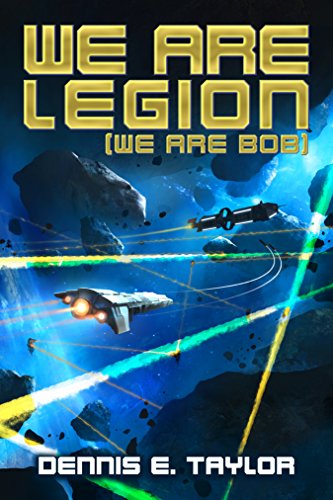


Plus the harder sci-fi of (fairly big) light based processor cores, able to faithfully simulate a scanned, biological brain (many times faster than real-time). His axioms are that a reactionless "SURGE" drive has been invented, with the same mechanisms allowing instantaneous "SUDDAR" scanning. Ok, I always accept implementing some fantasy science at the beginning. The initial scope seems exciting: what if you (an ASD software engineer type guy) got to become a sentient Von-Neumann probe? Although, if you were bored enough to have read the first novel, don't expect things to improve or ideas to really develop much in the 2 sequels. And there's no insight into the development of technology or science. Even the digital human(s) don't change or grow in a meaningful way. The axiomatic fiction technology that enables the setting of the story stands in isolation. In general, Taylor avoids the main virtue of the sci-fi genre: exploring possible major changes to civilisation. I was always more irritated than excited with this lazy plotting. All the close battles came down to the wire on a purely arbitrary basis: the opposed forces were nearly exactly matched in numbers. The opposite of Culture ship mind competency-porn. Virtually every crisis and setback is because a Bob was implausibly unprepared. But the challenges the author comes up with, for his guy(s) to deal with, are all uninspired, too there's outright tedious repetition throughout book 2, that feels like padding. It's a perfectly valid choice to focus on the nuts and bolts of events, instead of human intrigue - there's plenty enough of that already, in other genres. Or the refreshingly character driven plot of Ann Leckie's Ancillary Justice trilogy. The complete opposite of all the intrigue and Machiavellian twists and turn in something like Game of Thrones. With human societies not behaving plausibly, either. As there's only really one major character in the books, and he feels like he may be fairly autobiographical, in nature. It seems like the author may well fit this description, too. I'm assuming that they have been marketed and sold in such a targeted way that virtually only the target audience, of technically minded ASD (autistic spectrum) male sci-fi fans have generally bought them (including me, I guess). I'm a little puzzled why these are reviewed so highly. Also, I don't have the interest to read any more, for the reasons below.

But I'm going to treat the first 3 as a stand alone trilogy, seeing as they round off the plot arcs at the end of the third. I know there's now a forth book in the series, "Heaven's River". These were easy reading sci-fi and they can't have been that bad, given that I read all three consecutively. " We are Legion" (book 1), " For We Are Many" (book 2), " All The Worlds" (book 3).


 0 kommentar(er)
0 kommentar(er)
